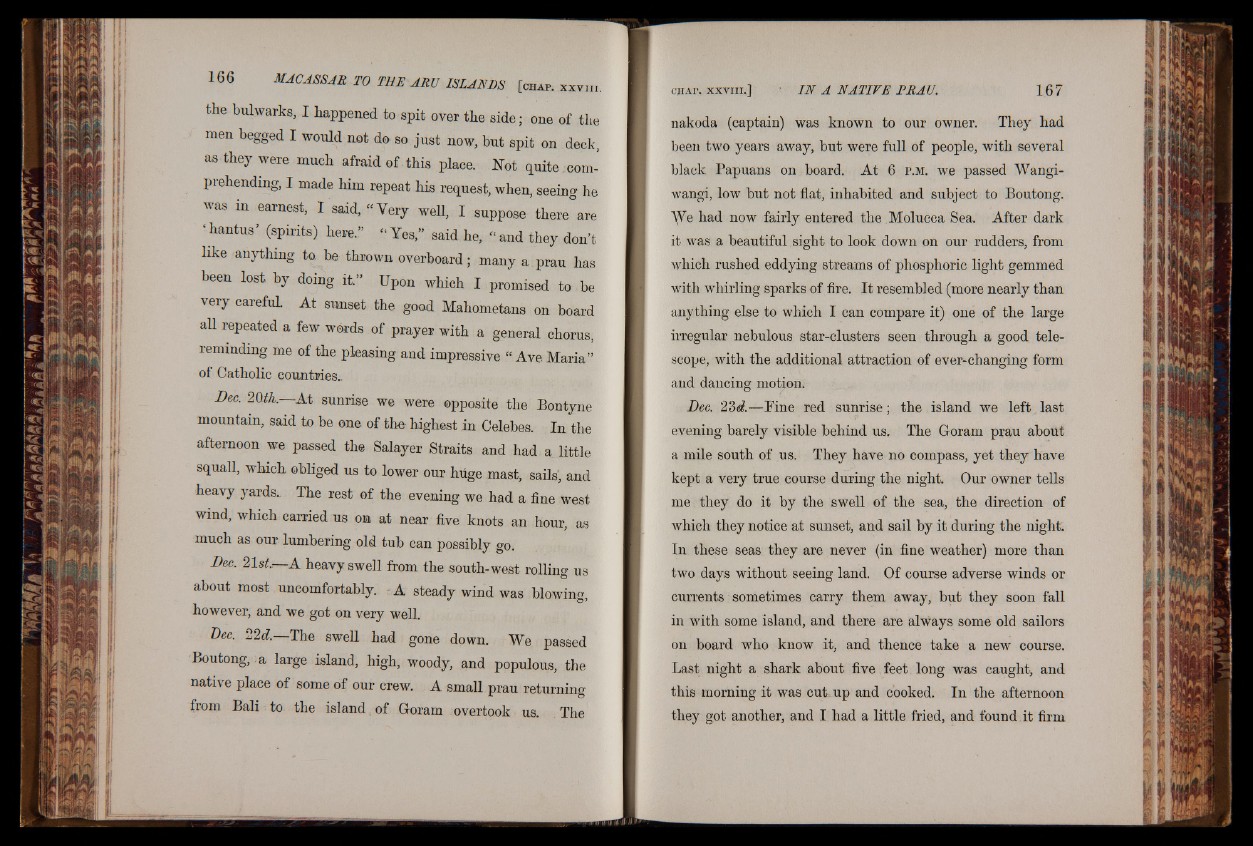
the bulwarks, I happened to spit over the side; one of the
men begged I would not do so just now, but spit on deck,
as they were much afraid of this place. Not quite com-
piehending, I made him repeat his request, when, seeing he
was in earnest, I said, “ Very well, I suppose there°are
‘hantus’ (spirits) here.” “ Yes,” said he, “ and they don’t
like anything to. be thrown overboard; many a prau has
been lost by doing it.” Upon which I promised to be
very careful At sunset the good Mahometans on board
all repeated a few words of prayer with a general chorus,
reminding me of the pleasing and impressive “ Ave Maria”
of Catholic countries-
Dec. 20.th. A t sunrise we were opposite the Bontyne
mountain, said to be one of the- highest in Celebes. In the
afternoon we passed the Salayer Straits and had a little
squall, which obliged us to lower our huge mast, sails', and
heavy yards- The rest of the evening we had a fine west
wind, which carried us on at near five knots an hour, as
much as our lumbering old tub can possibly go.
Dec. 21st. A heavy swell from the south-west rolling us
about most uncomfortably. -A steady wind was blowing,
however, and we got on very well.
Dec. 22d.—The swell had gone down. We passed
Boutong, a large island, high, woody, and populous, the
native place of some of our crew. A small prau returning
from Bali to the island of Goram overtook us. The
nakoda (captain) was known to our owner. They had
been two years away, but were full of people, with several
black Papuans on board. At 6 p.m. we passed Wangi-
wangi, low but not flat, inhabited and subject to Boutong.
We had now fairly entered the Molucca Sea. After dark
it was a beautiful sight to look down on our rudders, from
which rushed eddying streams of phosphoric light gemmed
with whirling sparks of fire. It resembled (more nearly than
anything else to which I can compare it) one of the large
irregular nebulous star-clusters seen through a good telescope,
with the additional attraction of ever-changing form
and dancing motion.
Dec. 23<9?.—Fine red sunrise; the island we left last
evening barely visible behind us. The Goram prau about
a mile south of us. They have no compass, yet they have
kept a very true course during the night. Our owner tells
me they do it by the swell of the sea, the direction of
which they notice at sunset, and sail by it during the night.
In these seas they are never (in fine weather) more than
two days without seeing land. Of course adverse winds or
currents sometimes carry them away, but they soon fall
in with some island, and there are always some old sailors
on board who know it, and thence take a new course.
Last night a shark about five feet long was caught, and
this morning it was cut up and cooked. In the afternoon
they got another, and I had a little fried, and found it firm